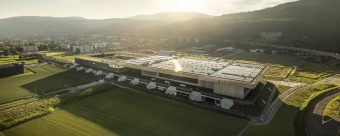Nearly half the world watched when Kylian Mbappe secured France’s second FIFA World Cup, scoring in the 4-2 win against Croatia. Fans in the Luzhniki Stadium in Moscow, Russia or in front of their TV’s didn’t miss a beat thanks to the optimal lighting, controlled by ABB’s i-bus KNX System.
The historic stadium, that hosted the 1980 Summer Olympics and the 2008 Champions League, is one of the many arenas in the world that rely on ABB technology to light up their events in an energy-efficient way.
Event arenas, which attract large gatherings of people, have tremendous potential in setting the stage for sustainability. Stadiums are increasingly adopting more sustainable ways of operating, such as efficiently using energy and utilizing renewable sources of energy. With ABB’s offerings across smart electrification and control solutions, venues such as the Luzhniki Stadium become more sustainable.
ABB has supplied its i-bus KNX system to Luzhniki, as part of its rebuilding for the World Cup. While managing the lighting throughout the stadium, the ABB system uses energy-saving algorithms that evaluate the time of day, natural illumination and the overall load on the power grid, resulting in significant energy savings and paving the way for an environment-friendly future.
In Norway, the Odd soccer club’s Skagerak Arena in Skien has its entire rooftop covered with 5,700 square meters of solar modules. They have a nominal power of 800kWp. The battery energy storage and the energy management system, provided by ABB, ensure maximum use of renewable power even when there is low light.
The photovoltaic system not only powers floodlights at the team’s home soccer games, but also provides the neighborhood with locally-produced electricity. ABB’s technology is also perfectly in tune with the Odds soccer club’s aim to be the greenest soccer club in Europe and the club’s largest supporter Skagerak Energi’s aim to form an energy lab.
ABB’s technology is also used at the Tissot Arena, world’s largest in-stadium solar power plant, located in Biel, Switzerland. The enormous sports complex features an extended roof which has about 16,500 square meters of space available for the solar modules, equivalent to a total size of two soccer fields. It is also a showcase project for the use of solar energy throughout Switzerland. The annual energy production of the plant equals the consumption of approximately 500 average Swiss households.

ABB’s power management technology, which includes the modular ArTuk distribution switchboards and switchgears, has helped the Ekana International Cricket Stadium and Sports Complex in India to stage international matches after a gap of two decades. Cricket, which has a huge fan following in South Asia, relies on energy intensive technologies to aid accurate refereeing decisions with real-time data from strategically positioned sensors, on-field cameras and gigantic screens around the field. ABB’s power management technology allows operators to maintain continuous and reliable power supply, while ensuring higher power savings during games.
ABB has also helped create a “smart” soccer stadium for FK Austria in Vienna, Austria. The Generali Arena has incorporated the latest in smart building technology and energy efficient power distribution. ABB has provided several components, including the KNX system which allows all components of lighting, shading, heating, air conditioning and ventilation in the stadium to be networked, ensuring maximum energy savings.
ABB has also provided dry transformers, which comply with the latest energy efficiency standards of the European Union. These transformers use a vacuum casting resin technology, developed by ABB, instead of oil. ABB’s smart solutions are helping the Generali Arena become the first sustainable soccer venue in Austria.
Source: ABB



